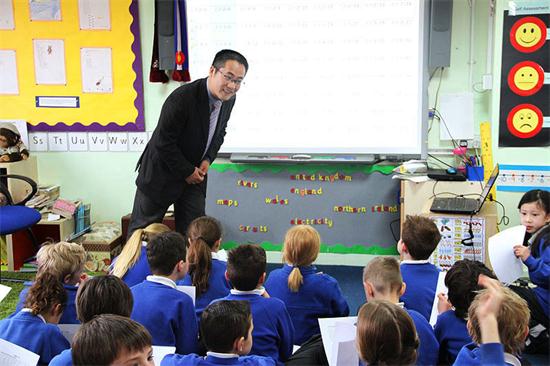 |
|
Wang Chengjun from Shanghai gives a class at Wroxham School near London. [Photo/CRIENGLISH.com] |
The British Department of Education announced recently that half of the primary schools in England will teach mathematic in the "Asian way", for which the government will provide huge funds to pay for teaching materials and teachers' training.
Because of the poor performance of British students in the Program for International Student Assessment, coordinated by the Organization for Economic Cooperation and Development, and Shanghai students' stellar showing in the assessment, many Britons had been asking the government to adopt the "Shanghai method" of teaching math. BBC has even made a documentary on how to introduce the Chinese math teaching method to British schools.
These developments have prompted some in China to assume the Chinese education model has got the global stamp of excellence. But let us not jump to conclusions.
Although the "Shanghai method" will be used in England's primary schools and teachers will be trained to follow it, it doesn't mean they have turned to the "Chinese education model" to achieve success.
Different from China's unified education administration system, schools in the United Kingdom enjoy a lot of freedom when it comes to managing their affairs. True, the British education authorities will provide teaching support and training service for schools, but the teachers will have the final say in the use of the "Shanghai method". This means teachers, two from each school, will indeed participate in the training programs but may not follow the "China model" in its entirety.
Besides, the education evaluation system in the UK is also different from China's. In China, math is the core subject in senior high school and the college entrance examination, and therefore China has a unified teaching standard for math and all students have to learn it. But in the UK, not everyone is expected to learn math because basic education in that country is focused more on the characteristics and interests of students. That may also be the reason why UK students' overall math score is not so high.
Given these facts, it is possible that teachers in England's primary schools will change their teaching style to a certain extent, but students and their parents may not support the complete change of the method to teach math, let alone having a unified standard like China for the subject.
Of course, an improvement in the math-teaching method may increase students' scores, which is what foreign teachers praise Chinese students for. But a student cannot become a top talent if he/she is good only at math but lacks sound knowledge of other subjects and is devoid of the innovation spirit. For example, Chinese middle school students are good at winning top prizes in international competitions but few grow up to be top scientists.
The problem in China is that despite having strong opinions on education, parents don't have a say in the teaching method because Chinese schools don't recognize the existence of parents' or teachers-parents' committees. But in the UK, parents' opinions matter a lot when it comes to teaching methods, which allows students to pay more attention to the subjects they are interested in rather than beating their brains out to learn something they don't like.
China's basic education system has a problem: it uses the same standard to evaluate all students. This means more than the teaching method, the problem is with the assessment system. Therefore, there is no need to believe China's basic education system is excellent just because schools in some countries follow the Chinese teaching model.
The author is deputy director of the 21st Century Education Research Institute.